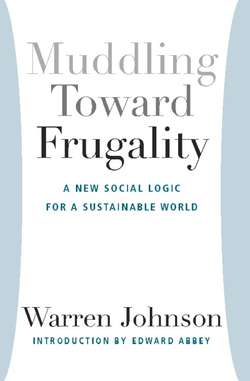Читать книгу Muddling Toward Frugality - Warren Johnson - Страница 12
На сайте Литреса книга снята с продажи.
ОглавлениеCHAPTER II
An Ecological View of History
The isolation of knowledge within disciplines has one advantage: different perspectives and insights can be seen if one looks across the empty space from one discipline to another. There is much truth in the argument that each discipline is as much a point of view as it is a body of knowledge. History, and particularly the process by which fundamental changes occur, looks quite different when seen in an ecological way. The account here—of necessity brief and highly generalized—is meant to suggest the manner in which change can be expected to occur in the future by looking at cultural changes that have occurred in the past. There are many different interpretations of historical experience. What is important is the process by which an equilibrium evolves, and how it is broken.
The historian is interested in the great figures of the past—statesmen, generals, philosophers, discoverers; as well as the base figures: tyrants, conquerors, traitors—all the actors and their interplay. The cultural ecologist stands farther away and cannot discern the individual players; their accomplishments, good or bad, appear only as variations in the surface texture of each era. The cultural ecologist looks for the general topography and asks why the slope tends upward or downward. Surface events are interesting, but only as they reflect the powerful underlying forces that determine man’s use of the environment and that lead to different methods of livelihood, larger populations, technological advance, or increased mobility. Anything that fundamentally changes the interrelationships between culture and the environment is of interest.
Ecological history is history from the ground up. It suggests that when the time is ripe, historical occurrences are virtually inevitable. The discovery of America was almost inevitable once the broad expansion of science, navigation, and maritime trade had reached a certain point; if Columbus had not done it, someone else soon would have. Luther simply made explicit the cultural gap that had appeared between the Renaissance church in Rome and the medieval church of northern Europe. Marx was only the most influential voice in a broad movement against the abuses of the factory owners during the Industrial Revolution. In recent times the pre-eminence of underlying forces is clearer still. The development of nuclear technology has occurred in virtually all countries that have the necessary technological sophistication and political will. The inventor is society as a whole rather than the individual. Are there at present no towering figures—either in this country or elsewhere—that can be said to be directing the course of events? I can think of none. Perhaps there never have been. The great leaders of the past were probably those who most clearly understood the trends of their times and were able to capitalize on them.
Our confidence in our ability to direct the course of events has been severely eroded by the experiences of the twentieth century. Several disastrous wars have occurred, against all efforts to prevent them, and even the United Nations has been almost totally unsuccessful in achieving the peaceful world that was its founding vision. We seem powerless to control crime, urban deterioration, overpopulation, the arms race, and nuclear proliferation. These experiences suggest that there is a grand dynamic in history that goes largely where it will and is highly resistant to efforts made to redirect it. Programs that try to counter it are unsuccessful, no matter how vigorously they are pursued, while programs that go with the grain of the times go smoothly and virtually fall into place.
Many of the changes stemming from resource scarcity will have this type of inexorability about them; they will shape our society whether we want them to or not, and no matter how hard we try to avoid them. In contrast to some social problems, which can be denied or suppressed, often for quite a long time, the shortage of essential raw materials will have a cold, hard effect on the functioning of our economy.
This does not mean we are helpless before the juggernaut of change. Even though there is little we can do to influence the onset of scarcity in the years immediately ahead, in the long run there is a process at work in our favor; it is the process of cultural evolution. Cultural evolution, when it has operated successfully, has been able to make life good in the past no matter how harsh the environmental circumstances; that is its genius. But successful cultural evolution is by no means assured. In the past, some societies have not survived, and others have evolved in unsatisfactory directions, into dead ends or traps, in much the same way that industrial society would be trapped if it allowed its basic resources to run out without making alternative arrangements. How we respond to the depletion of nonrenewable resources is not predetermined in any way. Cultural evolution is inevitable, but its direction is up to us.
By looking back at the halting process of cultural evolution in the past, we can get some idea of the nature of the process— its pace and the way different methods of livelihood have brought forth different types of human behavior. The earthiness of the ecological perspective requires that we focus on the different ways of making a living from the environment, and how this has been integrated with, and reinforced by, cultural inventions.
